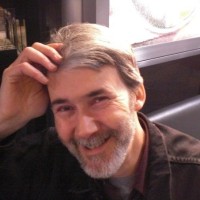The notebook, like the clothes and blankets, had absorbed so much cigarette smoke it felt damp and a little slick. What was written in it, a diary or a record of bets placed and lost or nothing but tic tac toe games played in the cramped solitude of the little unheated room above the saddest redneck dive he’d ever seen, Matt didn’t know. He dropped it in the trash bag and wiped his hands on his pants.
Death don’t make an asshole a saint, his father had said many times. So many, Matt thought, the man must have known more assholes than anything else, because whenever someone died this was the benediction. In the years since Matt had left Ohio and been on his own, he had found cause only on rare occasions to say it himself. It was a thing you only said, he felt, of a person who’d lived a mean, small, vicious life, whose signal achievements were negative things. He recognized that there was something in people, a common generosity perhaps, that inclined them to speak falsely well of such a person, even a real villain, after death. But this impulse Matt refused. As his father had, consistently.
He tried saying the words aloud in the little room, but couldn’t. For the first time, they struck him as profoundly sad, regretful. Like a judgment on a life meant to be better than it turned out, a recognition not of the bad in a man but the wasted, frustrated potential for the good people wanted to see. His father had been, in the end, more asshole than saint. But it might have been different.
There was an epitaph he’d mentioned. It was something he’d shared with Matt just once, shortly before he’d lost the house to the bank and been put on the street, maybe eight years ago now. Matt had returned to Cleveland for a high school friend’s wedding, and that October evening he’d left the reception at a hall in Slavic Village and met his father in a downtown bar. They’d had a drink and then walked out onto Euclid Avenue and down 18th Street to Short Vincent, eventually finding their way to the pier by the Coast Guard station at the end of Ninth Street, the wind off Lake Erie carrying the cold spray of mid-autumn to their faces. The sun was low above the water, and Matt imagined the snows of winter gathering darkly in the north, beyond the unseen, distant coast of Canada. They hadn’t had much to say. His father stood bent at the metal railing of the pier with his large hands crossed and elbows splayed along the rail, a half-smoked Marlboro between his lips. He could see his life’s trajectory in the fading light and it made him serious. “I know I won’t be remembered as great in any way,” he said. The cigarette’s glowing tip dropped ash that blew against the shoulder of his old suede coat. He snuffed it between his fingertips and flicked the butt over the water. Matt watched it carry back their way and disappear. “I just want someone to say, ‘He was a man.’ That’s all. It’s all I’ve ever tried to be.”
Whatever macho bullshit was intended that night—he was a man, standing tall against whatever life threw his way, indomitable and unbowed, imperfect but essentially noble and strong, Matt suspected—the statement had, in fact, become the only fitting way to remember Jim Silas. It didn’t mean what he hoped it might, but then he had to have known, he was too smart not to have known, how enormously he had failed to stand tall, and how many of the problems in his life were of his own making.
Matt looked around the cold little room, the cigarette smell an oil in his eyes. Through the threadbare, colorless square of curtain that hung across the window near the bed, the red lights of a barge on the Cuyahoga River blinked slowly, moving away past Whiskey Island toward the lake. Matt watched until the barge made a turn with the river and the lights were gone.
He gathered the mouth of the trash bag together and knotted it closed.
“He was a man,” he said.
Then he picked up the bag, turned off the overhead light, and left.


